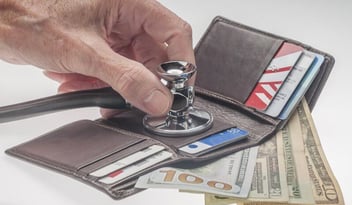Working with the finances of my Charlotte clients has given me a crash education in human behavior throughout the years. Many of my clients, even those who don't have a lot of money, amaze me with their generosity.
Other times... well, I think we might all benefit from the lesson that our human failings manifest themselves in our family's money. The truth is that we all deceive ourselves about what's going on in our wallets from time to time.
In the end, it comes down to a matter of the heart.
It's so easy to justify more expensive purchases because we convince ourselves that we "deserve it," or that rather than wanting this lovely thing (whether it's as basic and seemingly insignificant as a new outfit or a fancy dining experience), we "need" it.
The current financial crisis of the late 2000s was not solely a "Wall Street" phenomena. People who live on "Main Street" sometimes convince themselves that the house with the jumbo mortgage (and on a 3/1 ARM) is really necessary... when a more modest residence could have been just as adequate, if not more fun.
So, as it relates to our finances, I've developed a brief list of recommendations on how to approach these problems of the heart... as well as several basic ways to install guardrails.
In Charlotte, you can learn how to train your heart for good financial stewardship.
“Everyone is trying to accomplish something big, not realizing that life is made up of little things.” -Frank Clark
The idea is to train our hearts to be more clearly aligned with good financial stewardship and wisdom, something we aren't always used to doing.
Here are a few ideas to get you thinking...
Financial Stewardship Idea #1: Recognize why you're buying what you're buying.
The real reason we buy anything isn't always the same as the reason we think we're buying something.
Are you purchasing a new bike for your child because they require one? Or, perhaps, you're feeling bad because you don't think you're spending enough time with that child? Is that piece of jewelry you're buying for your wife just because you adore her... or because you want to show her something about yourself?
These are difficult questions to ask, but they must be asked. This leads to the second thought...
Financial Stewardship Idea #2: Create (and stick to) a budget.
All of the finances in the world may line themselves into your family computer, but if you don't use it, they're worthless. There are a plethora of wonderful apps and services to select from (like as YNAB or PowerWallet, among others), and they can make deciding whether or not to buy something much easier.
It's possible that Macy's is having a fantastic discount... However, if you exceed your budget, you risk harming not just your wallet, but also your heart.
Financial Stewardship Idea #3: Ditch the negative (expensive) behaviors and replace them with ones that function even better.
Shopping is frequently utilized to alleviate and numb our sorrow and pain. Recognize this in yourself when you have the time and space to do so (i.e., when you are not in immediate anguish or agony!) and look for ways to help your heart and soul re-program their response to pressure.
On a bad day, instead of hopping in the car and driving to Kohl's, go for a jog or a stroll. Read a book to your children, or go to a nearby coffee shop for a while. Those $4 lattes are pricey, but they're less expensive than a new set of golf clubs or a new clothing.
When our brain is under stress, the goal is to build new neural pathways.
Financial Stewardship Idea #4: Set a limit for each purchase as a financial stewardship idea.
Establishing limitations with your spouse for what you can call a "slush spending amount," or an amount of money you agree to spend without phoning each other and checking in, is a terrific idea. Obviously, this does not apply to needs like gas and groceries, but it may serve as the perfect trigger and responsibility to retrain your heart into better spending habits.
Financial Stewardship Idea #5: Practice the art of thankfulness as a financial stewardship idea.
This technique was known to the ancient Greeks as eucharisteo, and it can be a potent antidote to the harmful behavior of buying more "things" to feel better about oneself. Regardless of your current living circumstances, the fact remains that you have much to be grateful for. It primarily necessitates a willingness to observe. When it comes to our finances, dealing with our hearts is a difficult task. However, it is a critical first step toward a stable financial situation for your family.
Remember, we're here to assist you!
I appreciate your faith in me and the referrals you've given me.
Warmly,
Sara F Gonzalez
(704) 599-3355
Kohari & Gonzalez PLLC



